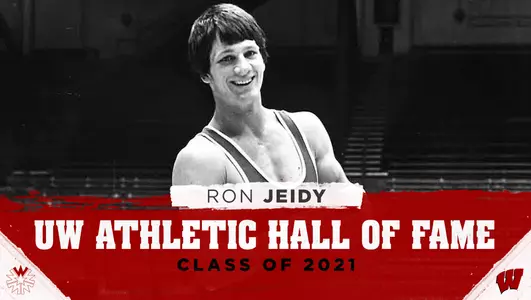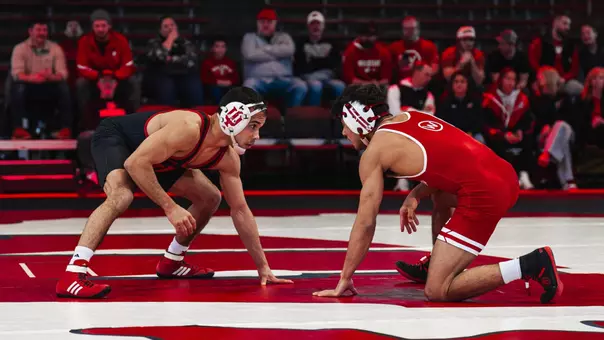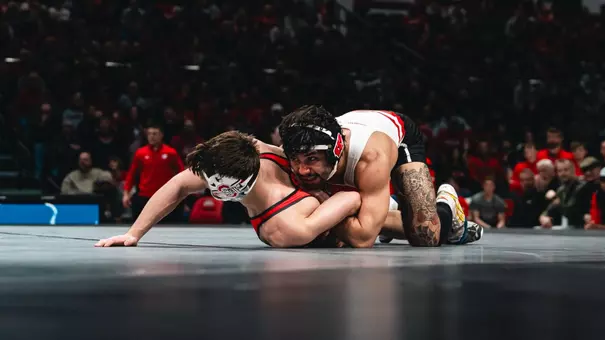
2021 UW Athletic Hall of Fame: Ron Jeidy
June 08, 2021 | General News, Wrestling
Badger wrestler earned 1978 NCAA title and trained with fellow UW greats
 |
|
|
BY ANDY BAGGOT
UWBadgers.com Insider
MADISON, Wis. — Imagine going to school each day and every class you attend is taught by a genius.
At first, the curriculum is so deep, daunting and fast-paced that you consistently get lost in the dialogue. You wonder if you're ever going to get the hang of it.
But with every lecture comes a tiny measure of enlightenment and confidence. Soon your IQ starts to reflect your level of persistence and wondrous moments come to life.
Ron Jeidy didn't just live this narrative, he embraced it with a distinct sense of purpose. As a result, he emerged as one of the standouts from the golden age of Wisconsin wrestling and now finds himself situated among the great student-athletes in program history.
Jeidy followed up a Big Ten Conference title with an NCAA championship at 190 pounds as a senior in 1978, achievements that earned him a place in the UW Athletic Hall of Fame class of 2021.
A native of Fennimore, Wisconsin, Jeidy went from being a near-afterthought on the recruiting trail to becoming one of 13 Badgers wrestlers to win an NCAA individual title and one of 10 national wrestling champions at UW to be inducted into its Hall of Fame.
Jeidy went from an athlete who battled injuries, forcing him to redshirt as a sophomore and struggled to make weight early in his career to one who staged a steady climb to greatness. So much of that journey was defined by the genius-level education Jeidy received at most every practice.
On any given day, he could venture to the far end of the spartan, steamy-hot wrestling room, located on the second level of Camp Randall Stadium, and work out with Ben Peterson, an Olympic gold medalist in 1972; John Peterson, an Olympic gold medalist in 1976; Russ Hellickson, the UW assistant coach who earned an Olympic silver medal in 1976; three-time NCAA and world titlist Lee Kemp; 1976 NCAA champion Pat Christenson; and Big Ten titlists Laurent Soucie and Ed Vatch.
"I always looked at it as a gift for me," Jeidy said, "where you kind of soaked up the osmosis of the room.
"I learned slow, but I learned. I learned to appreciate the culture, the benefits."
Duane Kleven, the UW Hall of Famer who coached the Badgers to unprecedented heights from 1970-82, said Jeidy had the luxury of having the best, most diverse group of workout partners in the world.
You had elite technicians in Hellickson (220 pounds) and brothers Ben (189) and John (180) Peterson. You had the quickness and athleticism of Kemp (163). You had the world-class tenacity of Christenson (167), Soucie (198) and Vatch (167).
"He was down there all the time because he was their size and he was strong," Kleven said of Jeidy. "They made him a champion.
"He survived it and just kept getting better. He really came on right at the end of his senior year."
Jeidy enrolled at UW in 1973 as a 177-pounder and soon became a mix of strength, agility and aerobic horsepower who was especially adept at countering and employing a lethal foot sweep.
From 1975 to '78, Jeidy was 80-18-3, including a 33-3-1 mark as a senior. He placed fourth in the Big Ten as a sophomore, second as a junior and stood atop the podium as a senior.
Jeidy lost twice to defending NCAA champion Frank Santana of Iowa State during the regular season as a senior, but prevailed in the national final. Jeidy was ahead 3-1 when a foot sweep — imagine a soccer-style kick so powerful that it completely takes out the legs of an opponent — forced Santana to default with a torn anterior cruciate knee ligament.

"When he finally figured out how good he was he was virtually unstoppable," Hellickson said of Jeidy.
Hellickson said Jeidy was the perfect student, a special talent.
"Remarkable in every way," Hellickson said. "I don't think of Ron Jeidy without putting a smile on my own face. There's nothing negative about the man.
"Ron's always been a pretty special guy. Guys that win national tournaments for you, you've got a special place for them in one corner of your brain. They paid the price. They did what you asked of them. They never complained about it. They got it done. When people get it done, they deserve to be on a special shelf."
Kleven didn't plan on recruiting Jeidy in part because Jeidy never won a match at the Wisconsin Interscholastic Athletic Association state meet.
But Al Bauman, the legendary coach at Mineral Point High School, gave Jeidy an endorsement that prompted Kleven to visit Jeidy at his family's 320-acre cattle farm. When Kleven got there he came across Ron and his brother, Wayne, loading bales of hay onto a wagon. Both were wearing wrestling shoes.
"We wrestle between loads," Ron explained.
Kleven knew dedication and athleticism — Ron also played quarterback for the football team and pitched for the Fennimore baseball squad — when he saw it. He offered Jeidy a partial scholarship.
Kleven had a way with finding talents like Jeidy and maximizing their abilities. From 1974 to '80, the Badgers produced nine NCAA champions and finished among the top 10 teams six times. All the titlists — Christenson, Jeidy, Kemp, Rick Lawinger, Jim Haines, Andy Rein and Jack Reinwand — are UW Hall of Fame inductees. So is Hellickson.
"I feel good now that they're all in," Kleven said.
"I felt honored," Jeidy said of the congratulatory call he received from Barry Alvarez, the UW director of athletics.
That Jeidy found success in such a rough-and-tumble sport is curious when you know that one of his favorite books is "Ferdinand The Bull." Written by Munro Leaf and published in 1936, the famed children's book tells the story of a bull that would rather smell the flowers than be involved with bull fighting.
"I identify 100 percent with Ferdinand," Jeidy said.
More than four decades removed from his time as a UW student-athlete — he majored in meat and animal science, and agricultural economics — Jeidy still considers his national title to be the No. 1 achievement on his resume outside of raising a family. But his current world, built around writing and sculpting, is more reflective of Ferdinand.
He lives in Portland, Oregon, with his second wife, Gail, who is also from Fennimore. They have two 20-something daughters, Mattie and Ally. He also has a daughter, Amanda, from his first marriage and a stepson, Robert.
Jeidy, 65, said he's written roughly 2,500 poems and is in the process of picking out 250 or so to publish in an anthology. He traced his interest in poetry to a class in high school where he became enamored with the work of William Shakespeare and Emily Dickinson. He remembers taking a test where everyone in the class had to memorize and recite lines from Shakespeare. Fifty lines earned you an "A" grade. Jeidy said he did 300.
Some of his poems draw from his athletic career and life on the farm. Some were inspired by fatherhood. Some were born of his divorce in the mid-1990s. Some embrace nature. Some were driven by the pandemic.
"If someone sets me down on a deserted island, I'd like to have a pen and paper with me," Jeidy said.
He offered two of his favorite lines:
"Accept this moment as though you'd chosen it."
"Every decision is a choice between a grievance and a miracle."
Another outlet for Jeidy involves designing and creating metal sculptures in his home studio. He said he's sold a few pieces and a friend has got him into some galleries, but it's not his job, per se.
"Just working on a craft, getting better at it," he said, explaining his motives. "It's the self-satisfaction of getting better at something."
Jeidy's work and that of his wife, Gail, can be found at http://soclever.com/. Ron said his wife has written several screen plays and books and serves as his editor. She also teaches writing at Portland Community College.
"She's a fine writer and I like her stuff," he said.
Jeidy has an odd keepsake from his time at UW. It's a metal pot that sits on a window sill in the family residence and is home to a flowering plant. Back in the day, it served as his go-to meal-maker for breakfast, lunch, dinner and dessert. He kept the pot and whatever contents it held — pasta, ice cream, eggs or meat — in the freezer. He based the practice on the belief that bacteria wouldn't grow in the cold.

The pot was legendary. Kemp wrote a paper on it. One of their former teammates, Jim Hanson, launched it out of an upper-floor apartment window to test its durability.
"I like to say I was into sustainability way back when," Jeidy joked.
No, he doesn't live or eat that way anymore.
"I'm not allowed," Jeidy joked again. "I've been retrained."
Hellickson is a two-time U.S. Olympian who spent time as a head coach at his alma mater and at Ohio State. He remembers Jeidy with fondness, calling him "as good a workout partner as I ever had."
That's saying a lot given the world-class company Hellickson and Jeidy kept back in the 1970s.
"That group was pretty phenomenal," Hellickson said. "That was a pretty special group without question."
Hellickson defined Jeidy as someone who came a long distance to reach the mountain top.
"I think he said one time that he didn't get many takedowns in the room, so he had to get them when he was on the mat," Hellickson said. "I think he got scored on a lot, but I think his response was, 'I can handle this. I'll get better.' And he did. He chose to improve."
Wrestling Match
A Poem By Ron Jeidy
I know what it means to be ungentle
in the center of the mat.
And I know how it feels
when the primal switch doesn't click
into high gear, like the childhood story
of Ferdinand who would rather smell flowers
than fight the other bulls.
A cross face whack to the head
puts me in the wild place,
the hard-to-find place,
but the right place for now.
My coach yells back to my gentle place,
careful of his neck,
ease up on his knee.
After the final whistle, I cross the edge
of the mat. Someone restacks rolls of white tape
like beads on an abacus,
blood-stained towels are replaced
with fresh whites.
My smile breaks loose from a hillside
of flowers in my head.













